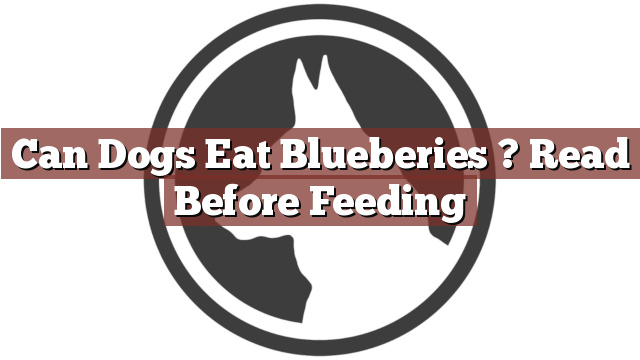Understanding Your Dog’s Dietary Needs
As pet owners, it is our responsibility to provide our furry friends with a balanced and nutritious diet. Understanding your dog’s dietary needs is crucial to ensure their overall health and well-being. While dogs primarily thrive on a diet consisting of meat and vegetables, certain fruits can also be incorporated into their meals. However, it is important to note that not all fruits are safe for dogs to consume. One such fruit that often raises questions among dog owners is blueberries.
Can Dogs Eat Blueberries? Read Before Feeding
Can dogs eat blueberries? Yes, they can! Blueberries are not toxic to dogs, and they can be a healthy addition to their diet. These tiny fruits are packed with essential vitamins, minerals, and antioxidants that can benefit your furry companion. They are low in calories and high in fiber, making them an excellent choice for dogs who need to manage their weight. The antioxidants found in blueberries can help boost your dog’s immune system, improve cognitive function, and even reduce the risk of certain diseases.
However, it is crucial to keep in mind that moderation is key when feeding blueberries to your dog. Too many blueberries can lead to an upset stomach or diarrhea. Additionally, always remember to wash the blueberries thoroughly and remove any stems or leaves before offering them to your furry friend. It is also advisable to introduce new foods gradually to your dog’s diet, including blueberries, to monitor any potential allergic reactions or digestive issues.
Pros and Cons of Feeding Blueberries to Dogs
Feeding blueberries to your dog has its pros and cons. On the positive side, blueberries are a nutritious and delicious treat that your dog will enjoy. They are a great source of vitamins C and K, manganese, and fiber. The antioxidants found in blueberries can help neutralize harmful free radicals in your dog’s body and promote a healthy immune system. Blueberries are also known to have anti-inflammatory properties, which can be beneficial for dogs suffering from joint pain or arthritis.
However, it is important to be aware of the potential downsides as well. Blueberries contain natural sugars, so feeding them in excess can contribute to weight gain or dental issues. Moreover, some dogs may be allergic to blueberries, just like any other food. Signs of allergies in dogs can include itching, redness, swelling, or gastrointestinal problems. If you notice any adverse reactions after feeding your dog blueberries, it is best to consult with your veterinarian to determine the cause and take appropriate action.
Conclusion: Moderation and Consultation for a Healthy Canine Diet
In conclusion, the answer to the question "can dogs eat blueberries?" is a definite yes. Blueberries can be a safe and nutritious treat for your furry friend when fed in moderation. They offer numerous health benefits and can be a great addition to your dog’s diet. However, it is important to remember that every dog is different, and what works for one may not work for another. If you have any concerns or questions about feeding blueberries or any other food to your dog, it is always best to consult with your veterinarian. They can provide you with personalized advice tailored to your dog’s specific needs and help ensure a healthy and balanced diet for your canine companion.
Thank you for taking the time to read through our exploration of [page_title]. As every dog lover knows, our furry friends have unique dietary needs and responses, often varying from one canine to another. This is why it's paramount to approach any changes in their diet with caution and knowledge.
Before introducing any new treats or making alterations to your dog's diet based on our insights, it's crucial to consult with a veterinarian about [page_title]. Their expertise ensures that the choices you make are well-suited to your particular pet's health and well-being.
Even seemingly harmless foods can sometimes lead to allergic reactions or digestive issues, which is why monitoring your dog after introducing any new food item is essential.
The content provided here on [page_title] is crafted with care, thorough research, and a genuine love for dogs. Nevertheless, it serves as a general guideline and should not be considered a substitute for professional veterinary advice.
Always prioritize the expert insights of your veterinarian, and remember that the health and happiness of your furry companion come first.
May your journey with your pet continue to be filled with joy, love, and safe culinary adventures. Happy reading, and even happier snacking for your canine friend!

